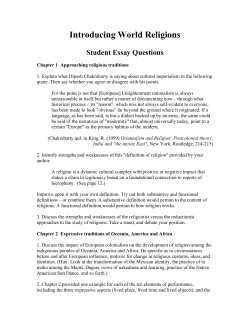
Marie Claire Foblets | Max Planck Institute
THE GOVERNANCE OF RELIGIOUS DIVERSITY MORE OR LESS SECULARISM? 10-12 June 2015 SESSION: RELIGIOUS DIVERSITY ACCOMMODATION AND BLASPHEMY LAWS: AREAS OF TENSION AND EXAMPLES OF FREEDOM OF RELIGION IN EUROPE: FINDING THE GOLDEN MEAN BETWEEN TOO LITTLE AND TOO MUCH PROTECTION Marie Claire Foblets | Max Planck Institute What is equality in the twenty-first century? How can identity – particularly religious identity – best be conceptualized in the space between justifiable differential treatment and discrimination? Historically, freedom of religion and belief has been among the best protected human rights in Europe. In practice, however, the form this protection takes is at least as varied as the histories of the various countries: a surprising diversity runs through the regulations and policies that legislatures and judiciaries have produced over time. But it is not only history that influences the approach to religion and belief and their protection under state law. More recently, new developments that seriously question the relationship between (state) law and religious identity are playing a role across Europe: on the one hand, there is the continuing secularization of societies, which diminishes the authority of traditional churches; on the other hand, new religions and convictions bear witness to the resurgence of belief. Strikingly, law in most European countries today – both the legislative frameworks in place and the case law – has an ambivalent relationship to this dual development: policies and lawmakers are very reluctant to develop a new understanding of religious identity and its protection, with the effect that mainstream/traditional/majority religions in many cases continue enjoying a protection – rooted in history – that is either being denied or is not as easily granted to new religions and non-faith-based convictions. This ambivalence produces a number of thoughtprovoking effects. One such effect is that, in practice, religious discrimination is more easily perceived and acknowledged as impermissible within the context of disputes involving mainstream/traditional/majority religions than is the case for other religions or beliefs. Another effect is that recourse to legal protection of religion plays out against other forms of discrimination such as age, disability, gender or race. These and other effects challenge our understanding(s) of discrimination and equality. This paper uses case studies borrowed from the findings of the RELIGARE research project on religious diversity and secularism in Europe (2010–2013, funded by the European Commission under the FP7 program) to highlight some of the controversial effects that come with the ambivalence that characterizes the relationship between law, religious identity and discrimination in contemporary European societies. Alternative approaches to dealing with the increasing religious diversity in Europe will also be proposed and explored.
© Copyright 2025





















